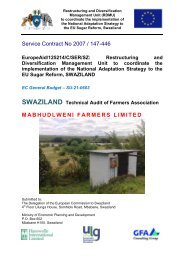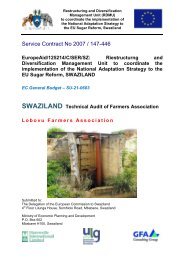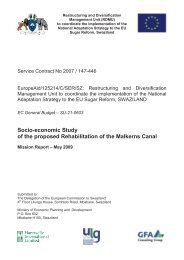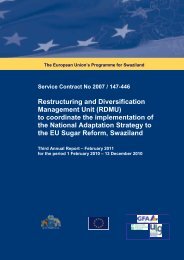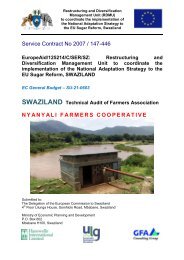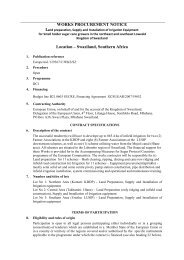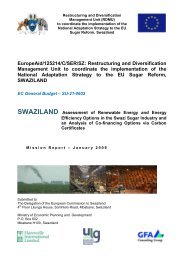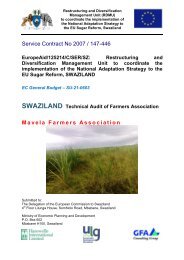Service Contract No 2007 / 147-446 Strategic ... - Swaziland
Service Contract No 2007 / 147-446 Strategic ... - Swaziland
Service Contract No 2007 / 147-446 Strategic ... - Swaziland
- No tags were found...
You also want an ePaper? Increase the reach of your titles
YUMPU automatically turns print PDFs into web optimized ePapers that Google loves.
The legal responsibilities for the monitoring of water quality are not clearly defined. Accordingto the Water Act (2003 – Art. 33(7)(g)) the River Basin Authorities (RBAs) are responsible “tomonitor and control water quality and enforce effluent regulations”. However, these dutiesand functions of the RBAs are yet to be established by the minister.Before the RBAs become fully functional, it is the Water Resources Branch in theDepartment of Water Affairs (Ministry of Natural Resources and Energy) that has theresponsibility for the monitoring of water quality. Unfortunately no publicly available waterquality reports have been produced, and the StrEA team was not able to identify the waterquality monitoring data produced by the DWA. The State of the Environment Report for<strong>Swaziland</strong> (2001) points out to water pollution from industrial activities, although with noreference to agricultural runoff or the sugar industry.Under the Water Pollution Control Regulations (2010) - which fall under the EnvironmentManagement Act (2002) – every “water authority that has a duty to monitor water quality” hasto advise the “Authority” (i.e. the SEA) in case of non-compliance with the water qualityobjectives (Art. 3.2); as well, they have to produce an annual report to the Authorityconcerning the quality of water bodies under their jurisdiction (Art. 3.4). A “water authority” isdefined as “an authority which is legally responsible for monitoring or controlling water qualityand without limitation, includes the Water Apportionment Board, the National WaterAuthority, River Basin Authorities and the Geological Survey and Mines Department of theMinistry of Natural Resources”.In this context the RBAs will have to start engaging in monitoring of water quality andreporting findings. This has not yet occurred and there is a gap on water quality data for<strong>Swaziland</strong>.Some sources of information on water contamination from agricultural run-off can begathered from other sources, such as a study carried out by RSSC (Mhlanga et al, 2006) andthe monitoring carried out by SWADE for LUSIP according to the CMP.The water quality in the rivers that traverse the sugar cane areas (i.e. Usuthu, Mbuluzi andKomati) has been decreasing at an alarming rate, according to various independentstudies 54 . The above study, which looks into the impacts of irrigation return flows from RSSCon the quality of receiving waters in the Mbuluzi River Basin, concludes that “return flowsfrom sugar cane irrigated fields at RSSC discharges into the Mbuluzi River contribute toelevated pollution levels as observed in the water quality status of the field drainagestreams”, and that the effect of return flows on water quality is influenced by the amount ofwater flow. The main contaminants include Total Dissolved Solids (TDS), sodium,Suspended Solids (SS), electroconductivity, magnesium, calcium and sodium adsorptionratio (SAR). Nevertheless pollution in the Mbuluzi River would only occur during low flows, asotherwise the River has a large dilution capacity.5.7.2 Expected impacts in absence of the NASThe main factor influencing water contamination associated to the sugar industry is theexpansion of lands under sugar cane, which is already taking place and will continue. Thus itdoes not make sense to consider a hypothetical case where no expansion takes place.54 Dlamini, MN (2004) An investigation on the quality, pre-treatment and impacts of effluent from Sappi-Usuthu Pulp Mill inthe great Usuthu River, Unpublished MSc Thesis, Department of Civil Engineering, University of Zimbabwe; JTKAssociates and Knight Piesold Consulting Engineers (2002) Water availability in the Mbuluzi River Basin, Mbabane,<strong>Swaziland</strong>; and Muthimkhulu, S (2004) Biological assessment of the state of the water quality using the South AfricanScoring System (SASS); a case of the Mbuluzi River, <strong>Swaziland</strong>. All cited in Mhlanga et al, 2006.RDMU (<strong>Strategic</strong> Environmental Assessment of the National Adaptation Strategy) - Page 95



